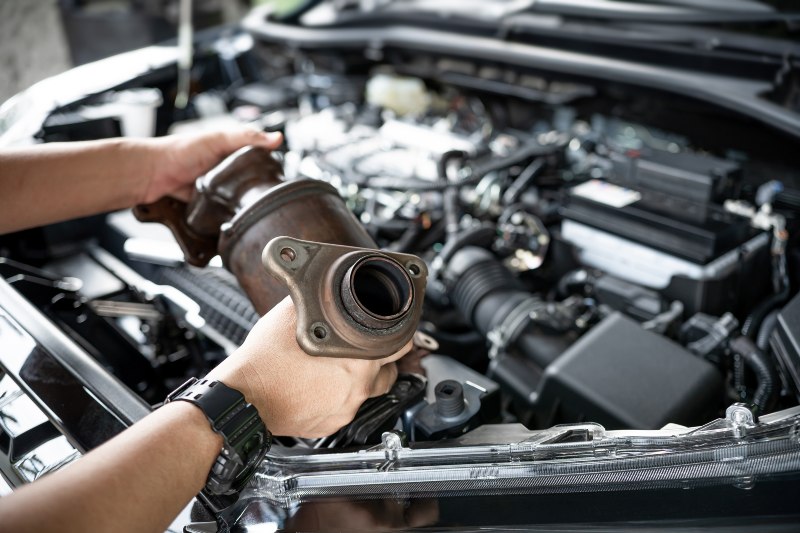How to Tell If You Need a New Catalytic Converter
Your vehicle’s catalytic converter is an essential component of its exhaust system. It’s responsible for converting harmful emissions like carbon monoxide and nitrogen oxides into less harmful gases before they exit the tailpipe. This role not only helps the environment but also ensures your car complies with emissions regulations. However, catalytic converters wear out over time due to use, contamination, or physical damage. Knowing the signs of a bad catalytic converter can save you from costly repairs and legal troubles.

Signs You May Need a Catalytic Converter Replacement
If you aren’t sure whether you need to replace your catalytic converter, start by checking for these tell-tale signs:
1. Decreased Engine Performance
One of the earliest and most noticeable symptoms of a failing catalytic converter is a drop in engine performance. If your vehicle struggles to accelerate, feels underpowered, or seems sluggish when climbing hills, the problem might be a clogged catalytic converter. A bad catalytic converter disrupts the flow of exhaust gases, causing back pressure in the engine. This can make it harder for your car to perform, eventually leading to more severe engine issues if left unchecked.
2. Reduced Fuel Efficiency
Your catalytic converter works in tandem with your engine’s combustion process. When it’s not functioning correctly, your engine may burn more fuel than necessary to compensate for the disruption. A noticeable drop in fuel efficiency—especially if you’ve ruled out other factors like underinflated tires or dirty air filters—can indicate it’s time to change a catalytic converter.
3. Rattling Noises
If you hear a distinct rattling sound coming from underneath your car, it could mean the internal honeycomb structure of the catalytic converter has broken down. This structure is designed to maximize the surface area for converting harmful gases, but physical damage or wear over time can cause it to deteriorate. Ignoring these noises can lead to further damage to your exhaust system and potentially require a full exhaust system replacement in addition to a new catalytic converter.
4. Ignition and Starting Issues
Have you had trouble starting your car? A failing catalytic converter can cause exhaust gases to build up, creating back pressure that makes ignition difficult. This issue might be occasional at first, but it can quickly worsen, potentially leaving you stranded. If you’re dealing with frequent ignition problems, it’s worth having your catalytic converter inspected by a professional.
5. Check Engine Light is On
Your car’s Check Engine Light (CEL) is a warning system that alerts you to potential issues. A failing catalytic converter is a common reason for the CEL to illuminate, especially if the onboard diagnostics system detects high levels of harmful emissions. A diagnostic scan can identify if the error codes are related to the catalytic converter, saving you time and effort in troubleshooting. If the light is on and you’ve noticed other signs of a failing converter, it’s time to consider a catalytic converter replacement.
6. Poor Acceleration
Is your car hesitating when you press the gas pedal or struggling to reach higher speeds? Poor acceleration can often be traced back to a clogged or failing catalytic converter. When the converter is blocked, exhaust gases can’t flow freely, reducing your engine’s ability to generate power. This is especially noticeable during highway driving or when towing heavy loads.
7. Consistent Misfires
Engine misfires—frequent skipping or popping noises—are another indicator of a failing catalytic converter. Misfires can be caused by overheating or restricted airflow through the converter. In some cases, these misfires can cause damage to other components, such as your spark plugs or oxygen sensors.
What Causes Catalytic Converters to Fail?
Catalytic converters don’t fail without reason. Here are a few common causes:
- Contamination: Using the wrong type of fuel or having engine leak into the exhaust system can coat the converter and reduce its efficiency.
- Overheating: Running the engine with a faulty oxygen sensor or other issues can cause the converter to overheat, leading to premature failure.
- Physical Damage: Hitting road debris or driving over rough terrain can damage the converter’s casing or internal structure.
How to Prevent Catalytic Converter Issues
To prolong the lifespan of your catalytic converter, there are several steps you can take. Using high-quality fuel can help minimize contamination and reduce the risk of deposits building up inside the converter. Regular engine maintenance, such as timely oil changes and replacing spark plugs, also plays a key role in keeping the converter functioning efficiently. Additionally, it’s important to address check engine lights and performance issues as soon as they arise, as ignoring these warnings can lead to further damage to the catalytic converter and other components of your vehicle.
Visit Maryland Muffler for Catalytic Converter Replacement
At Maryland Muffler in Millersville, Maryland, we specialize in diagnosing and repairing catalytic converters. Whether your vehicle needs an inspection or a new catalytic converter, our skilled technicians are ready to assist. When it comes to changing catalytic converters, we use only high-quality parts to ensure long-lasting performance. Don’t let a failing catalytic converter impact your car’s performance or fuel efficiency. Contact Maryland Muffler today to schedule an appointment and get your vehicle back on the road running like new.
